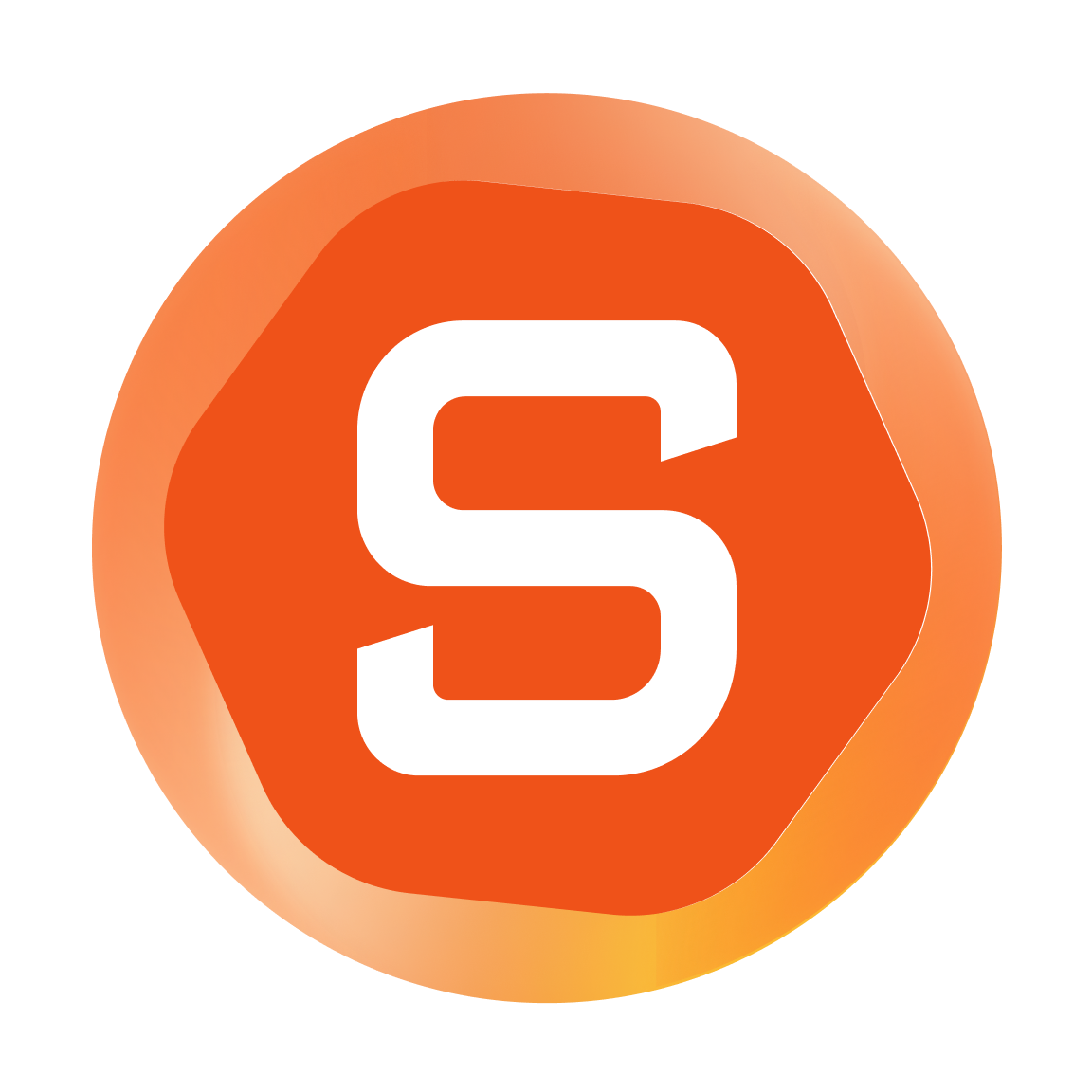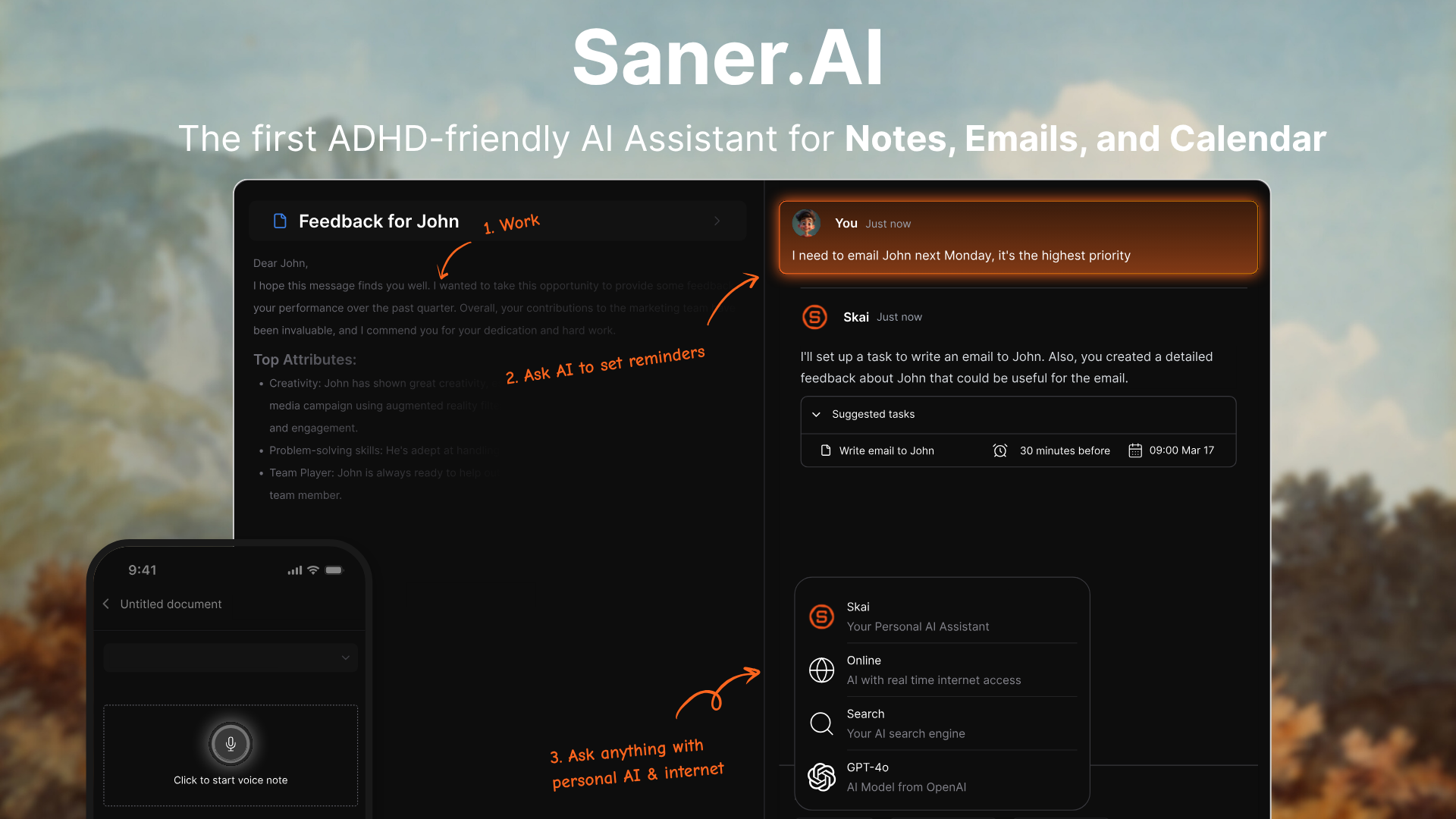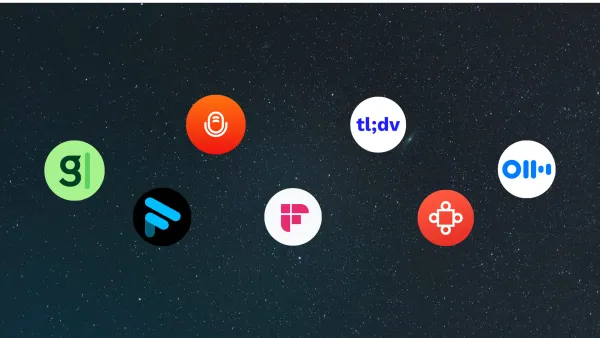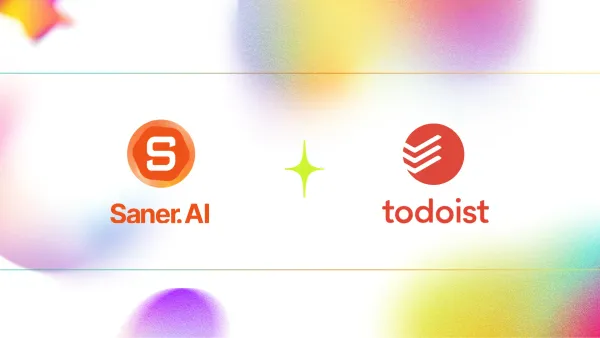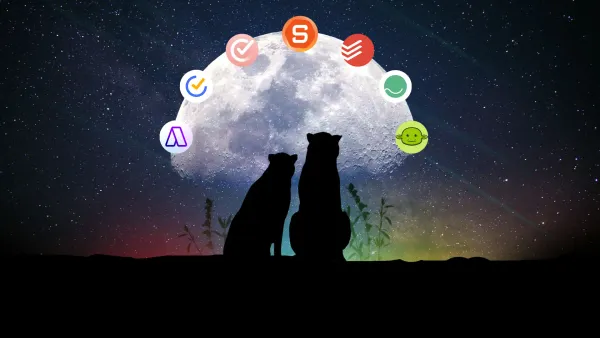AI Knowledge Management: The Ultimate Guide and Tools
The best AI Knowledge Management tools for Personal Use are Saner.AI, Notion AI, Fabric, and MyMind

Why AI Knowledge Management Matters Now
We live in a world drowning in information but starving for insight. Knowledge workers - entrepreneurs, researchers, and team leaders - spend hours each week digging through emails, chat threads, documents, and meeting notes just to find what they already know. Traditional knowledge management systems weren’t designed for this velocity, volume, or mess.
Enter AI knowledge management - a new way to organize, retrieve, and synthesize information that works at the speed of thought. It’s not just a software trend. It’s becoming a foundational layer for modern work.

1) What is AI Knowledge Management?
AI knowledge management (AI KM) is the practice of using artificial intelligence to capture, organize, retrieve, and analyze information. Instead of manually tagging notes or creating folder hierarchies, AI can automatically:
- Understand natural language across notes, docs, and messages
- Link related concepts and files
- Summarize long-form content into digestible insights
- Help you synthesize ideas from disparate sources
Put simply: It’s like having a second brain that helps you remember and connect everything.
2) Why Traditional Knowledge Management is Broken
Traditional KM tools (like SharePoint, Google Drive, or static wikis) rely on manual organization and human memory to be effective. That’s a problem.
Here’s what’s broken:
- Knowledge silos: Information is scattered across tools (email, Slack, Docs, Notion).
- Outdated taxonomies: Rigid folder structures don’t match how people think.
- Poor discoverability: You need to know the right keywords to find something.
- High maintenance: Manual tagging and curation don’t scale.
And worst of all? Knowledge decays. Teams and people forget what they’ve already learned.
3) Core Benefits of AI in Knowledge Management
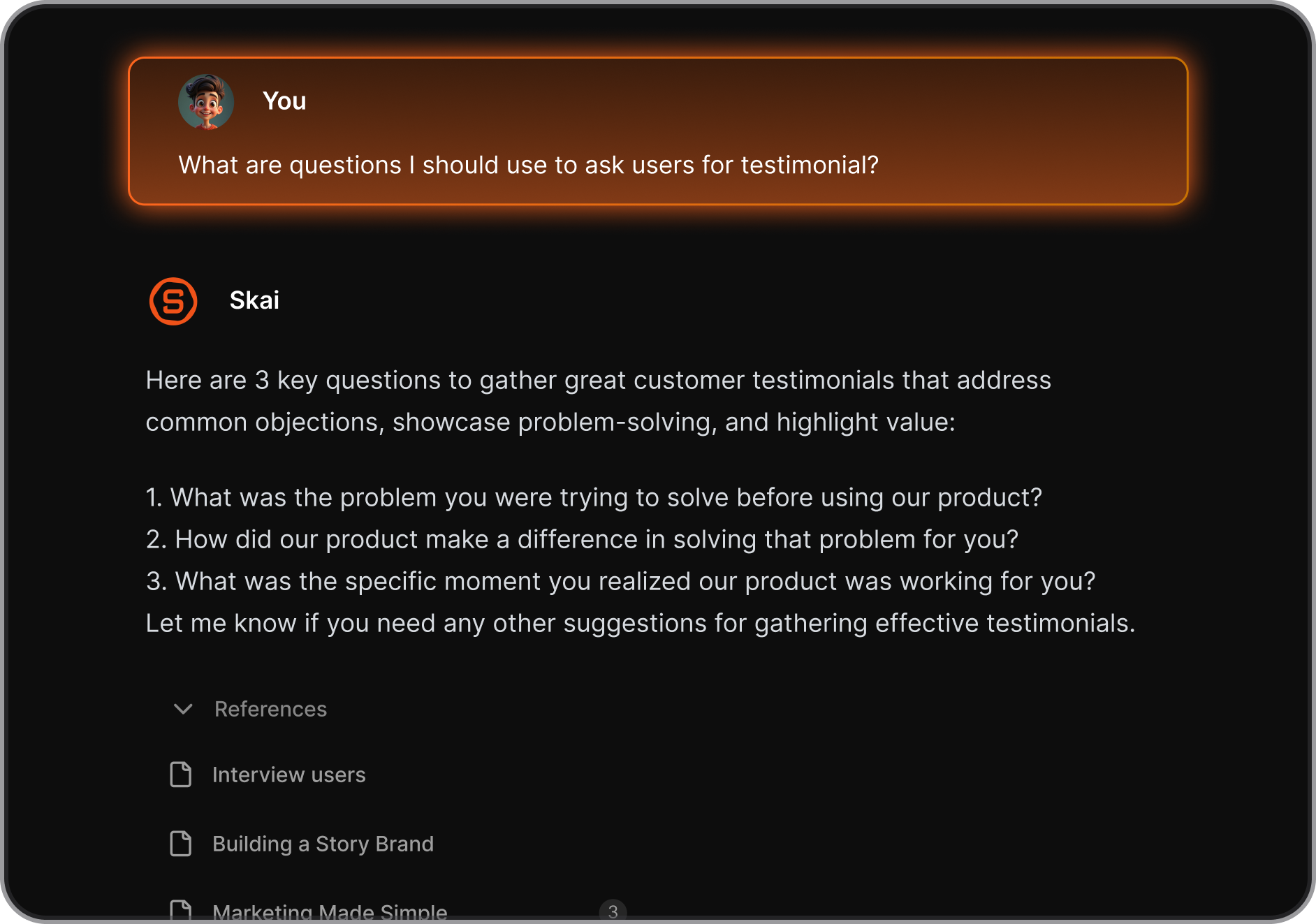
Smarter Search
AI doesn’t rely on exact matches. Instead, it understands semantic meaning. That means you can search for:
- “Who did we talk to about pricing last year?”
- “Summarize our UX feedback from interviews.”
- “Show me insights about competitor launches.”
It works across formats - meeting transcripts, PDFs, Slack threads—and gives you answers, not just files.
Automatic Summarization & Tagging
AI can extract key points from long content, making it easier to scan and reuse:
- Meeting notes → Key action items
- Research articles → TL;DR summaries
- Transcripts → Organized insights with topics
Plus, it can automatically tag content with relevant themes, people, and projects.
Synthesizing Insights from Multiple Sources
This is where AI KM truly shines. It can:
- Compare data across interviews
- Surface contradictions or trends
- Generate insights across time and documents
You no longer need to remember where you saw something—AI brings the puzzle pieces together.
4) Real-World Use Cases
For Teams:
- Sales teams analyzing call transcripts for objections
- Product teams summarizing user feedback
- Ops teams connecting policy docs with updates
For Individuals:
- Researchers synthesizing journal articles
- Founders tracking investor conversations
- Consultants organizing client insights
Best AI Knowledge Management Tools
1. AI KMS for individuals
The best AI Knowledge Management tools for Personal Use are Saner.AI, Notion AI, Fabric, and MyMind
1. Saner.AI

Saner.AI is an AI knowledge management tool that feels like a second brain, especially if you’re someone who gets overwhelmed by scattered thoughts and tabs. It helps you quickly capture ideas, organize them effortlessly, and ask your past self questions - without the usual mess of folders, labels, or context switching.
It’s built for individuals like me who want less chaos, more clarity.
Key features
- Smart AI assistant that understands your notes and answers your questions
- Chrome extension to capture highlights, articles, or thoughts from any tab
- Auto-tagging and natural language search to find stuff without remembering exact keywords
- Graph and list views to make connections between notes
- Integrations with Gmail, Slack, Google Drive, and more
- Distraction-free interface, designed with ADHD in mind
What I liked
- I love how fast it is to capture something without thinking about where it goes - it just gets it.
- Skai is actually helpful. I can ask things like “What have I been thinking about pricing strategy?” and it gives me a solid summary from my own notes.
- The extension is a game-changer. I can grab stuff mid-browse without breaking flow.
- It’s super clean and simple
- I can sync my emails and ask AI about them - super powerful since I have a lot of knowledge sent via Gmail
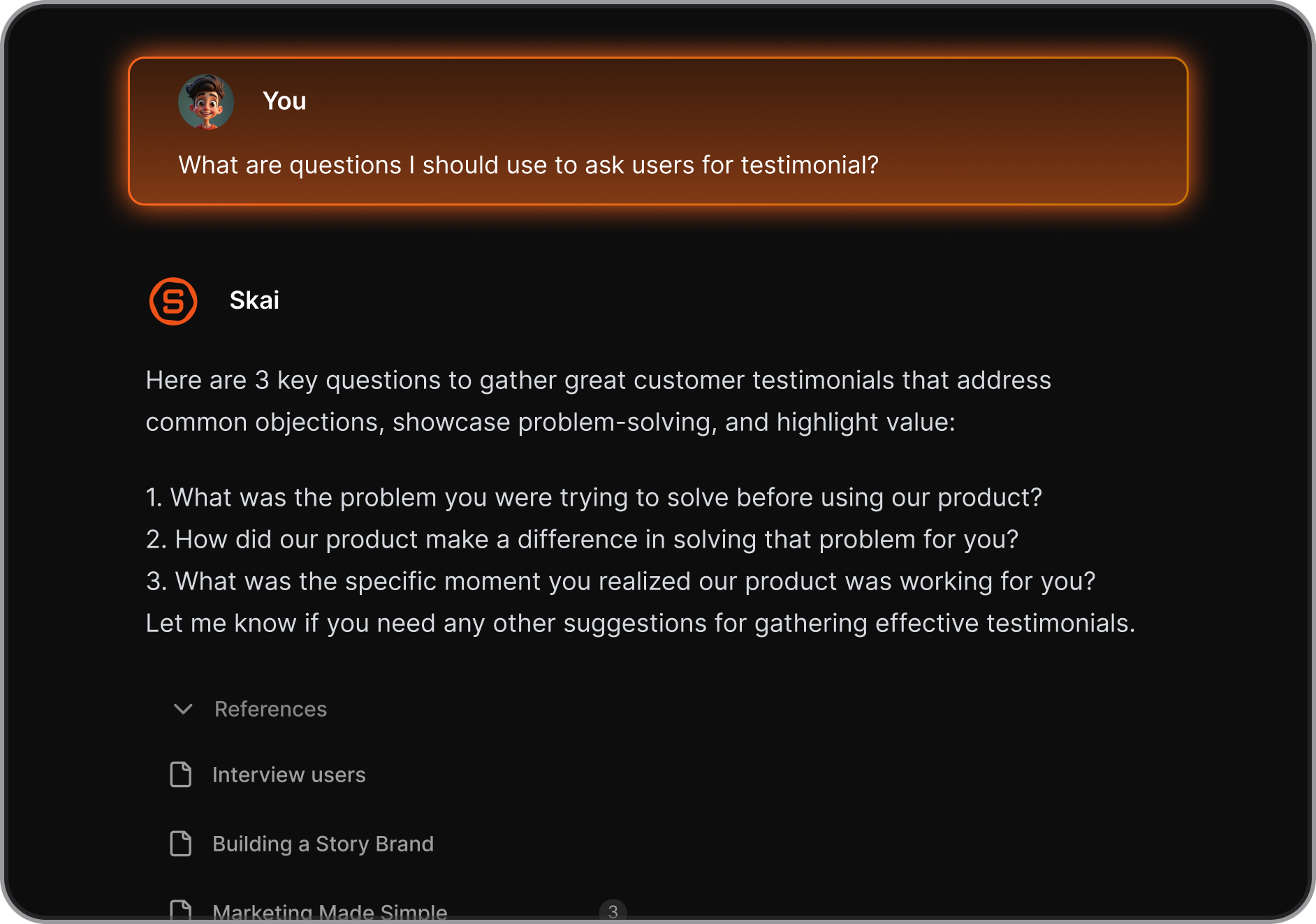
Cons
- Requires internet access for full functionality.
Pricing
- Free
- Starter: Monthly at $8/month, Annually at $6/month (with early user discount)
- Standard: Monthly at $16/month, Annually at $12/month (with early user discount)
Suitable for
Anyone who’s drowning in information and wants an AI to-do list that actually helps think through the chaos.
Especially good for entrepreneurs, researchers, and people with ADHD who don’t want to manually organize everything.
Saner.AI Reviews
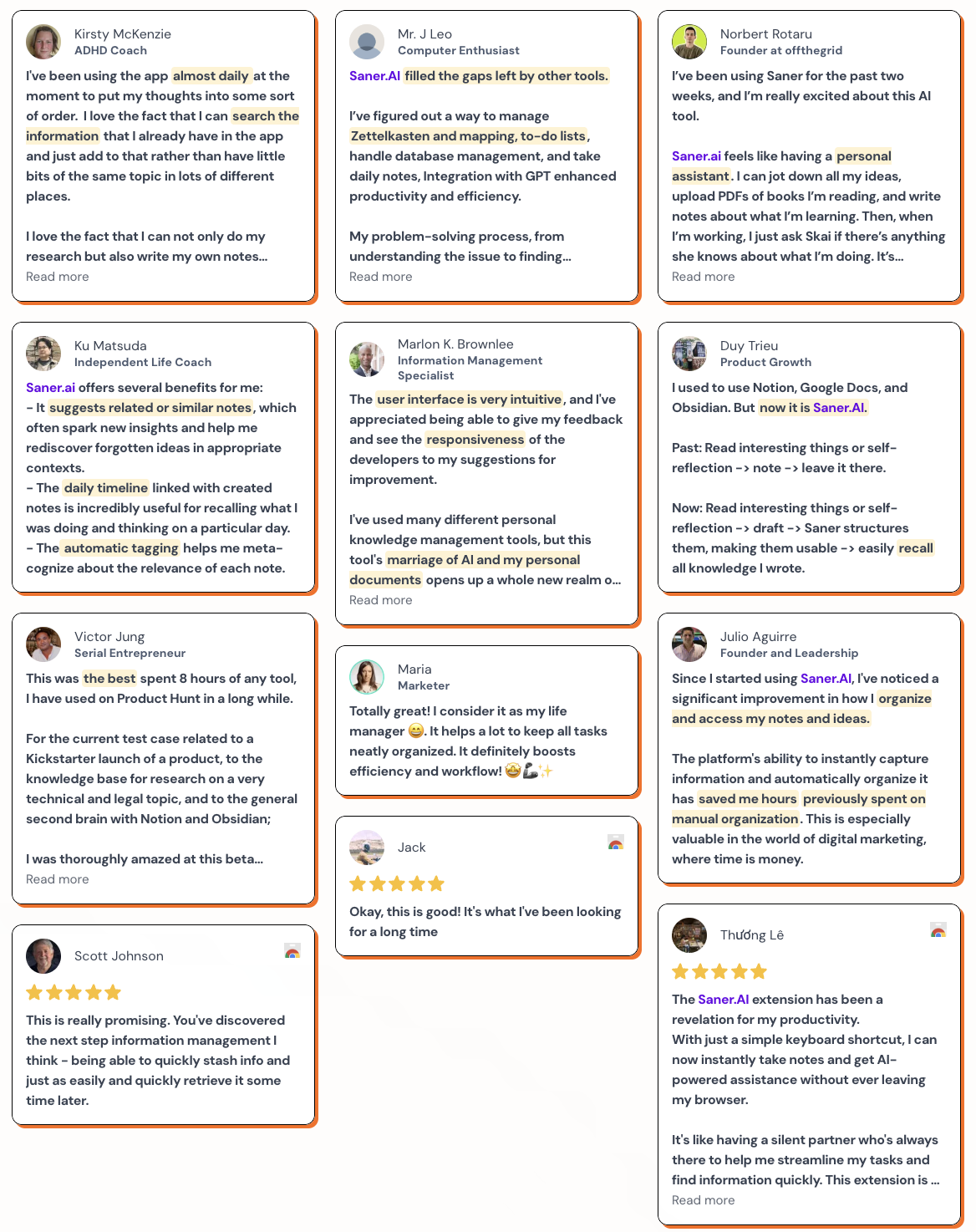
How to start
Just go to saner.ai, make a free account, connect your tools, and start chatting with Skai. The AI will suggest tasks and help you organize without the usual friction.
Stay on top of your knowledge
2. Notion
Notion is an all-in-one workspace that’s become a serious player in AI Knowledge Management. You can write, organize, and now use AI to summarize, answer questions, and even verify content - all in one place. It's like having a second brain that helps you manage what you know, not just where you write it down.
It’s ideal for teams building internal knowledge hubs or creators who want AI to actually understand their content.
Key features
- AI Q&A: Ask questions and get answers from your workspace content
- Smart summaries: Summarize meeting notes, docs, or research in seconds
- Knowledge hubs: Create internal wikis with AI that can answer team questions
- Visual AI: Automatically generate charts, timelines, and dashboards from data
- Works across notes, databases, tasks, and docs
What I liked:
- I like that AI works in notes
- Creating a knowledge hub with AI answers is useful for onboarding or SOPs.
What I disliked:
- The free plan only gives you a limited AI trial—you’ll need to pay to get real value.
- It takes some setup to use well. Notion’s powerful, but it’s not plug-and-play and can become complicated
- If you have a huge workspace, the AI can feel a bit slow at times.
Pricing:
- Free plan includes 20 AI responses
- Business plan starts at $15/user/month for full AI access
- Enterprise plans available with custom pricing
Suitable for:
Teams, creators, or founders looking to build smart internal knowledge bases or want AI to help manage and retrieve what they already know.
How to start:
Go to Notion, sign up, start a free trial, and explore the AI features in your workspace.
Notion reviews (source)

3. Fabric

Fabric is an AI knowledge management tool that helps you save notes, PDFs, screenshots, links, and automatically connects the dots. With smart AI summaries, semantic search, and a clean interface, it’s great for managing lots of information without getting overwhelmed.
Key features
- AI Search & Auto-Connections: Automatically links related content, no folders or tagging needed
- Web Clipper & Hotkeys: Easy to save articles, thoughts, and screenshots in the flow
- Rich Notes & Editing: Full-featured note editor with collaboration and markdown
- Mobile & Desktop Apps: Capture ideas anywhere, not just from your browser
- Privacy & Encryption: Everything’s encrypted, both in transit and at rest
What I liked
- The timeline view is intuitive, especially for visual thinkers.
- The weekly recaps are actually useful.
What I disliked
- Integrations are still limited.
- The AI feels early-stage in some places. A few bugs here and there.
- You don't have an AI chat interface with your tasks, calendar, emails like in Saner.AI
Pricing
- Free plan with basic features
- Paid plans start around $6/month, with more power and storage as you go
Suitable for
Anyone who wants an AI-powered knowledge management tool that helps them stay organized, remember more, and actually use the things they save
How to start
Just head to Fabric, create a free account, and start capturing. The more you put in, the smarter it gets.
Fabric reviews (source)

4. Mem
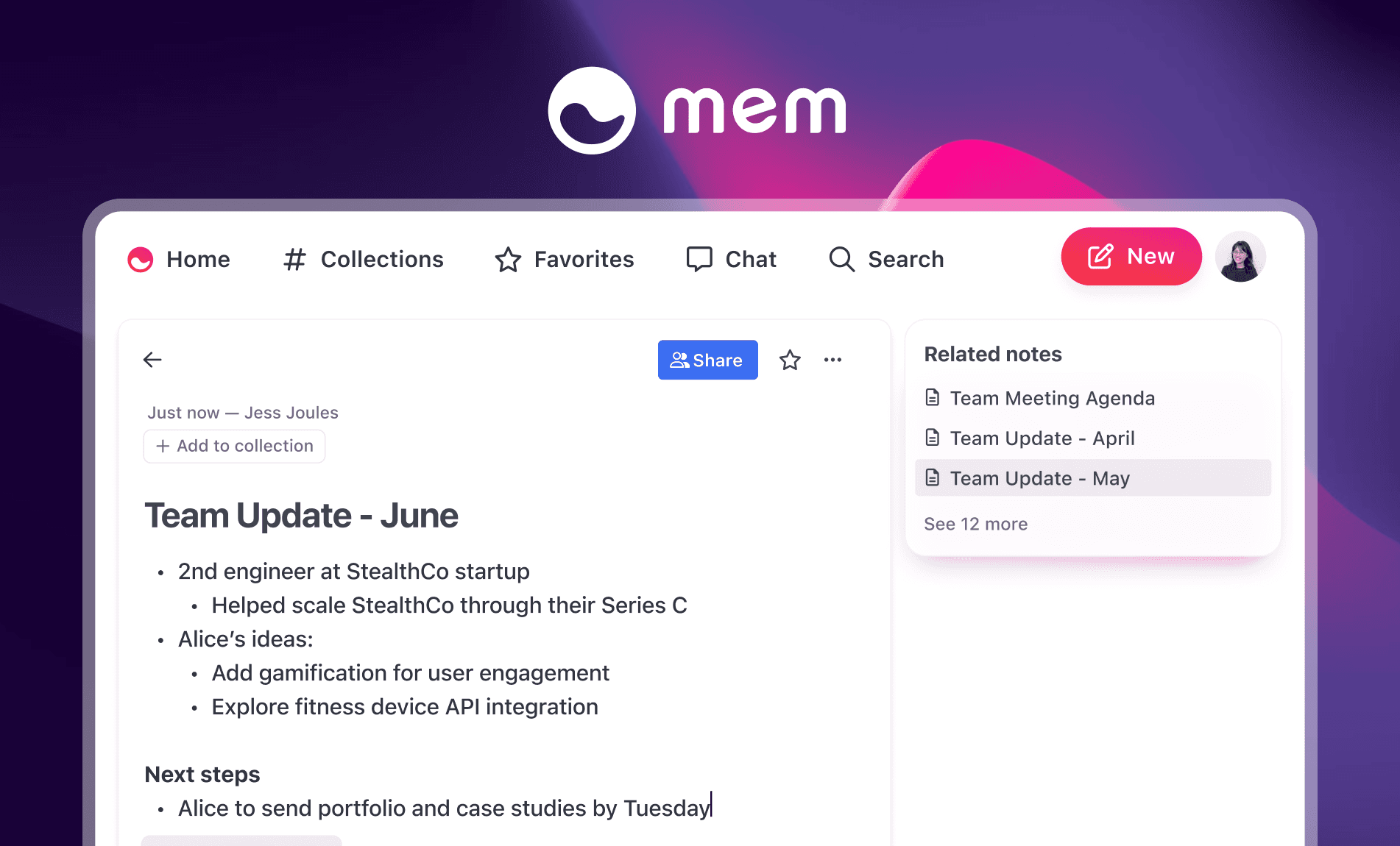
Mem.ai is an AI knowledge management tool that helps you capture, connect, and retrieve ideas without having to organize everything yourself.
Key features
- Smart Search: Ask questions in plain English and find exactly what you need
- AI Assistant: Chat with your notes to get summaries, drafts, and insights
- Cross-device Sync: Works on web, Mac, Windows, and iOS (beta)
What I liked:
- The AI chat is useful.
- It feels much lighter than traditional note apps
What I disliked:
- The mobile app still feels a bit early - missing Android and iOS is still in beta
- Importing from other tools wasn’t flawless
- Not ideal for project management - there are no timelines or dependencies
- You can't chat with AI to manage your tasks, emails, calendar like with Saner.AI
Pricing:
- Free plan with core features
- Paid plan (Mem X) starts around $10/month for AI and automation
- Custom pricing for teams and businesses
Suitable for:
Solo professionals, researchers, and knowledge workers who want a self-organizing, AI-powered note system without the overhead of traditional folders and structure.
How to start:
Just go to mem.ai, sign up for free, and start capturing. You can upgrade to Mem X anytime if you want more AI features.
Mem Reviews (Source)
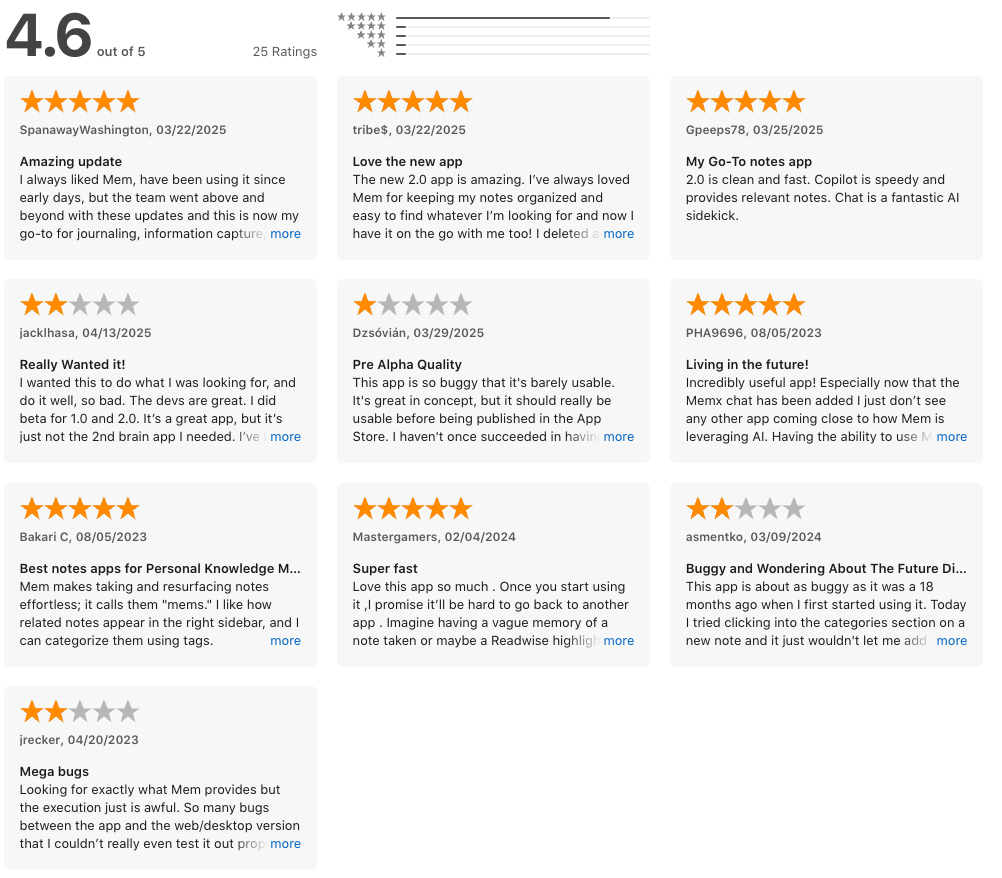
5. MyMind

MyMind is an AI knowledge management tool designed for visual thinkers and creatives. Unlike traditional productivity apps, MyMind doesn’t force you into folders, tags, or manual organization.
Key features
- AI Auto-Organization: Instantly recognizes what I save
- Smart Search: I can search by keyword, color, object, even mood
- Easy Capture: Save anything from the web or phone
- Smart Spaces: Automatically groups related content without me lifting a finger
- Privacy-First: No ads, no tracking, no social feeds
What I liked
- I like that I can just save creative things and trust I’ll find them later
- The search is fast
- The UI is beautiful and calming, which makes me want to use it
- It’s completely private, which gives me peace of mind
What I disliked
- There’s no real structure for notes or tasks, so it’s not great for managing projects
- The AI tagging can miss sometimes, like labeling something the wrong color
- Exporting content isn’t as smooth as I’d like
- You can't chat with AI to manage your tasks, emails, calendar like with Saner.AI
Pricing
- Free plan with limited saves
- Full access around $12/month
Suitable for
People who want an easy, beautiful, private way to capture and recall information, especially creatives, visual thinkers, and anyone overwhelmed by traditional note-taking apps
How to start
Go to mymind, create a free account, install the browser extension, and just start saving things. The AI takes care of the rest.
MyMind Review (Source)
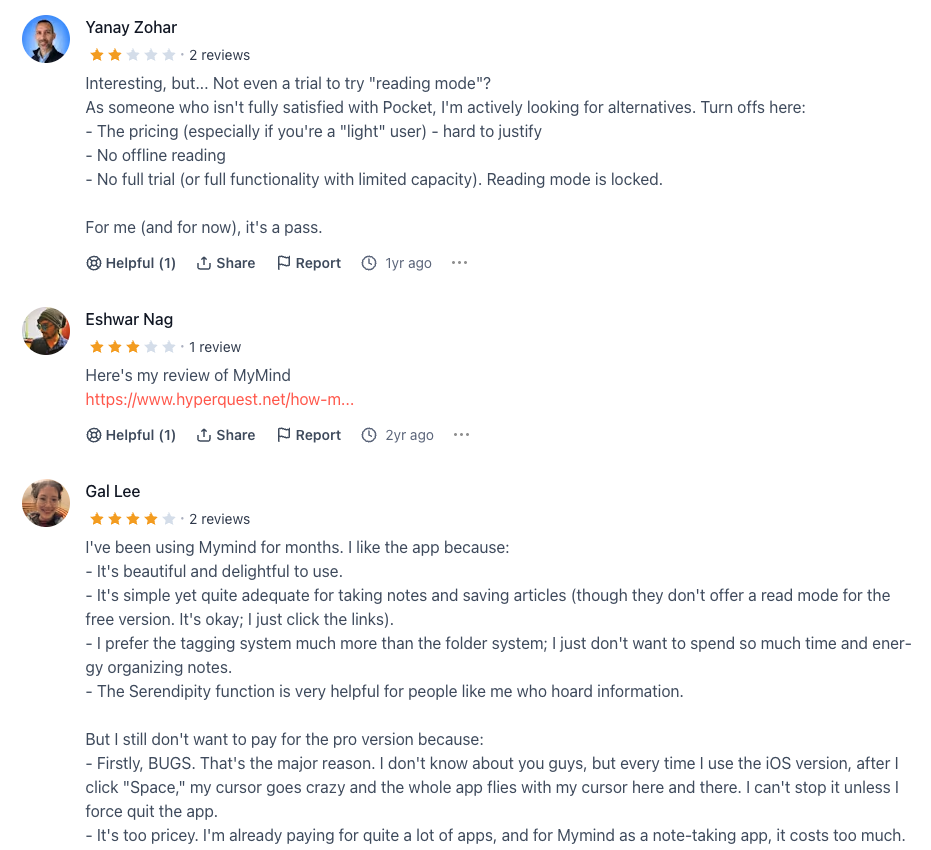
2. AI KMS for businesses
1. Glean

Glean is an AI Knowledge Management tool that helps you find anything across your company’s tools
Think of it as a smart internal search bar that actually understands what you’re looking for. It pulls from Slack, Google Drive, Notion, Salesforce, and more, so you’re not stuck asking around or digging through folders.
Key features
- AI-powered search: Ask questions in plain English and get instant answers from across your company’s tools
- Personalized results: Takes into account your role, team, and past behavior
- Collections & Go Links: Let's you curate and share important resources
- Smart agents: Summarize convos, suggest relevant docs, and help draft responses
- Permission-aware: Respects access controls, so no oversharing
- Fast setup: Connects to most work tools in under 2 hours
What I liked
- I like how fast and relevant the search is
- The smart summaries are great for catching up on Slack threads without reading the whole thing
- The interface felt familiar
What I disliked
- It’s not built for creating long-form knowledge like a wiki
- Some Slack info is limited lately because of API restrictions
- And while the AI is powerful, it’s not a chatbot you can have full conversations with
Pricing
- No public plans
- Custom pricing based on your company size and tools
Suitable for
Mid-to-large teams who want a smarter way to manage internal knowledge, especially if you’re juggling lots of tools and tired of “where was that again?” moments.
How to start
Just go to Glean, book a demo, and connect your tools. You’ll be searching smarter in no time.
Glean review (source)

2. Slite

Slite is an AI knowledge base that helps teams keep their internal docs clean, organized, and easy to search. It uses smart AI tools to surface answers, format content, and keep your company’s knowledge up to date
It’s a great fit for teams who want a fast, no-fuss way to manage knowledge and find what they need.
Key features
- AI Editor: Helps you write, edit, and format documents faster
- Ask (AI Search): Let's you ask natural-language questions and get accurate answers from your docs
- Knowledge Health: Spots outdated pages and assigns owners to clean them up
- Templates: Keeps your docs consistent with built-in templates and prompts
- Team Collaboration: Threaded comments, mentions, and real-time editing
- Integrations: Connects with Slack, Google Drive, Figma, Notion, and more
What I liked
- The Ask feature is incredibly helpful
- I like how lightweight and clean the UI is
- The auto-formatting and grammar help can save a ton of editing time
What I disliked
- It’s not built for project management
- The free plan limits how many AI searches you can make
- If your team’s not already good at writing things down, you’ll need to create a habit first
Pricing
- Free plan with basic features
- Standard: $8/user/month – includes AI editing and limited “Ask” usage
- Premium: $12.50/user/month – adds admin tools and analytics
Suitable for:
Remote teams, fast-growing startups, and anyone who wants a smarter way to manage internal knowledge without drowning in docs.
How to start:
Just go to slite.com, sign up for free, and start building your team’s knowledge base with the help of AI.
Slite review (source)

5. How to Implement AI Knowledge Management in Your Workflow
You don’t need to overhaul everything. Start small:
- Pick a use case – e.g., meeting notes or research synthesis
- Choose a tool that fits your stack (like Saner.ai for notes, Glean for search)
- Set up passive capture – import notes, documents, and conversations
- Experiment with queries – test how AI responds to real questions
- Train your team – build habits around asking better questions and validating answers
6. Future Trends in AI and Knowledge Work
Expect these trends in the coming years:
- Multimodal KM – AI will link text, audio, video, and diagrams
- Personalized knowledge graphs – Dynamic maps of what you know and how it connects
- Assistant-led workflows – AI agents that proactively retrieve and summarize info
- Ethical AI frameworks – Standardizing trust and transparency in knowledge tools
The future of knowledge work is human + AI, working together in flow.
7. Conclusion
AI knowledge management is no longer optional. It’s the foundation of modern productivity, especially for knowledge workers navigating complexity and speed.
Start with a small workflow. Let AI reduce friction. Over time, you’ll build a system that works the way your brain does - and better.
Manage your knowledge effortlessly with AI
8. FAQ on AI Knowledge Management
1. What is AI knowledge management?
AI knowledge management is the use of artificial intelligence to capture, organize, search, and retrieve information across an individual’s or organization’s knowledge base. Instead of manually tagging documents or remembering where everything is stored, AI systems help surface what you need, when you need it.
You might hear people say:
- “Find me that note from last week’s meeting”
- “Summarize everything I’ve saved about user onboarding”
- “What are the key insights from our customer interviews?”
AI knowledge management tools like Saner.AI, Notion AI, or Mem streamline information retrieval, reduce mental clutter, and help you connect the dots between scattered thoughts and files.
2. Why is AI important in knowledge management?
Because traditional systems rely on you to do all the organizing. AI flips that model:
- Understands natural language queries (“What’s the plan for Q3?”)
- Finds context-rich answers, even from unstructured notes
- Learns from your patterns to suggest relevant information proactively
The result? Less time searching, more time thinking.
3. What can an AI knowledge management system do?
A modern AI knowledge management system helps you:
- 🧠 Search smarter – Understands meaning, not just keywords
- ✍️ Summarize – Condenses long documents, notes, and transcripts
- ✅ Organize passively – Auto-tags, clusters, and links related items
- 🔁 Resurface insights – Brings back relevant knowledge when you're working on something similar
- 🔎 Synthesize – Helps compare and contrast multiple pieces of information
Saner.AI, for example, acts like an AI research assistant that’s always quietly organizing your brain behind the scenes.
4. Who should use AI for knowledge management?
AI knowledge management is especially useful for:
- Entrepreneurs & Founders juggling multiple ideas and conversations
- Researchers managing hundreds of notes, sources, and hypotheses
- Managers & Directors who need fast access to past decisions and documents
- ADHDers or anyone who struggles with context switching and information overload
Basically, if your brain feels like 20 tabs open at once, AI can help close a few.
5. How is AI knowledge management different from regular note-taking?
Traditional note apps (like Apple Notes or Evernote) are digital notebooks. You write, store, and organize them manually.
AI-powered tools like Saner.AI go further:
| Traditional Notes | AI Knowledge Management |
|---|---|
| You search with keywords | You ask questions in plain language |
| You organize with folders/tags | AI organizes for you |
| Static info | Dynamic insights and summaries |
With AI, your knowledge base becomes an active, thinking system—not just a digital filing cabinet.
6. Is AI knowledge management safe?
Most reputable tools encrypt your data and don’t share it with third parties. Some even let you run models locally or choose private modes
Always check:
- Data privacy policies
- Whether your notes are used for training AI models
- If you can export or delete your data easily
7. Are there free AI knowledge management tools?
Yes! You can start using AI knowledge tools without spending a dime:
- Saner.AI – Free plan includes AI-powered search, reminders, and smart note organization
- Notion AI – Available on free Notion accounts with limited usage
- ChatGPT with custom instructions – Lets you build a Personal Knowledge Assistant with GPT
Perfect for testing before committing.
8. What’s the best AI knowledge management tool for ADHD?
Saner.AI is especially ADHD-friendly:
- Chat with AI to search for the anything
- Cuts down on tab-switching
- Surfaces the right notes at the right time
- Converts messy brain dumps into actionable tasks
- No setup required—just start typing and it learns as you go
Instead of forcing structure, it works with how your brain naturally functions.
9. Can AI help with meeting notes and prep?
Absolutely. AI knowledge tools like Saner.AI can:
- Pull key decisions from last week’s meetings
- Remind you of action items before your next call
- Surface-related context (notes, tasks, follow-ups) with one question
Instead of scrambling through folders, you get a calm summary. Ask:
“What did we agree on in the product sync last Thursday?”
…and your AI pulls up exactly what you need.
10. How do I start using AI for knowledge management?
Start simple:
- Ask it to find old notes
- Let it summarize a long doc
- Try asking a fuzzy question (“What did I say about onboarding last month?”)
Over time, it learns how you think and becomes more useful every day. No tags. No formatting. Just type.
11. Can AI really help me be more productive?
Yes. Especially if your productivity blockers include:
- Forgetting where you saved things
- Losing momentum switching between tools
- Getting overwhelmed by cluttered notes
AI reduces that mental friction. Tools like Saner.AI show you what matters now and hide the rest until it’s relevant again.
12. Can AI knowledge management work with messy or unstructured notes?
Yes - and that’s exactly where AI shines.
Most people don’t write perfect notes. You jot down half-thoughts, bullet lists, and scattered links. AI can:
- Understand the the meaning even when grammar is off
- Pull related ideas together across different notes
- Help you find things you forgot you even saved
For example, you could ask Saner.AI:
“What were my thoughts on onboarding flow?”
Even if you only wrote “onboard needs fix – too many steps,” it’ll still find and summarize it for you.
13. What’s the difference between AI knowledge management and AI search engines?
AI search engines (like Perplexity, ChatGPT, or Google Gemini) answer questions from the internet.
AI knowledge management tools answer questions from your own brain.
| Feature | AI Search Engine (e.g. ChatGPT, Perplexity, Gemini) | AI Knowledge Management Tool (e.g. Saner.AI, Mem, Notion AI) |
|---|---|---|
| Primary Data Source | Public internet and external sources | Your personal or team knowledge base |
| Purpose | General research and answering broad questions | Organizing, recalling, and connecting your own notes and insights |
| Search Style | Asks questions about the world | Asks questions about your world |
| Example Prompt | “What’s the latest research on remote work?” | “What did I write about remote work in March?” |
| Content Understanding | Summarizes articles and answers from the web | Understands messy, unstructured personal notes |
| Privacy | Varies—data may be stored or used for training | Usually private to you (depends on the tool) |
| Interactivity | Answers questions, may need follow-up to go deeper | Continuously learns from how you write and work |
| Best For | Learning something new | Remembering something you've already thought, saved, or written |
Use both together: AI search for learning, AI knowledge management for remembering.
14. Does AI knowledge management work across tools (like Gmail, Google Docs, Notion)?
Some tools do, some don’t.
Many AI systems are starting to connect across your digital life, pulling in:
- Emails (like from Gmail or Outlook)
- Meeting notes (Google Docs, Notion, etc.)
- Calendar events
- PDFs or articles you've saved
For example, Saner.AI integrates calendar + notes + tasks to give you a single brain-like view. Just check for integrations before you commit.
15. Can teams use AI knowledge management, or is it just for individuals?
AI knowledge management works for both, but in different ways.
- For individuals: It’s your personal brain, helping you recall, plan, and act faster
- For teams: It centralizes knowledge, avoids duplicate work, and keeps everyone aligned
